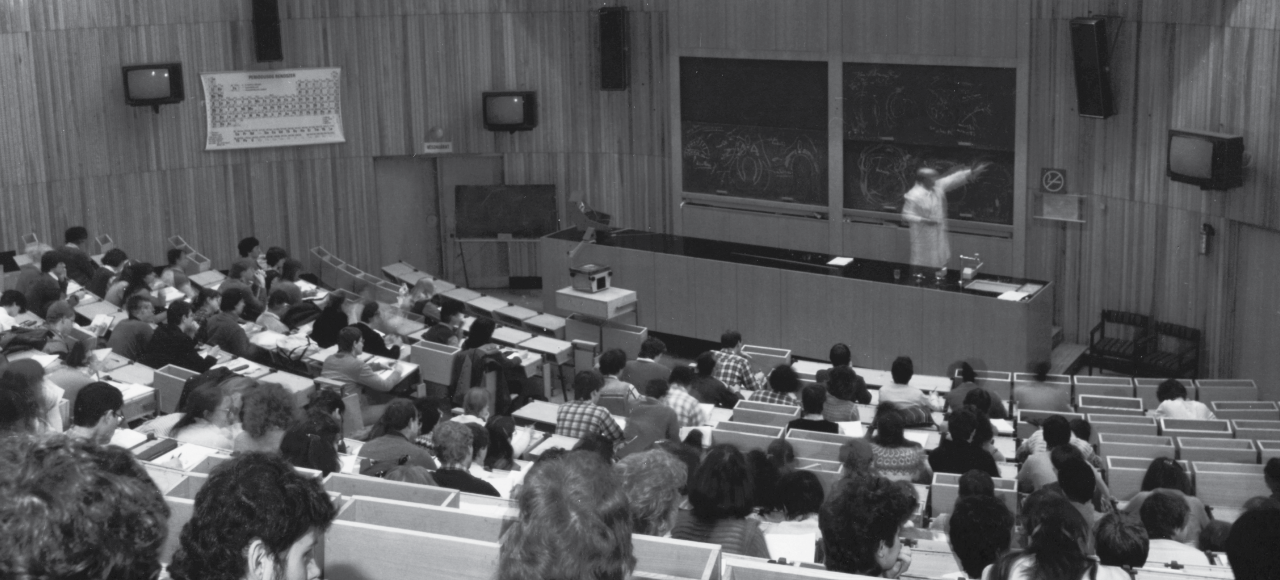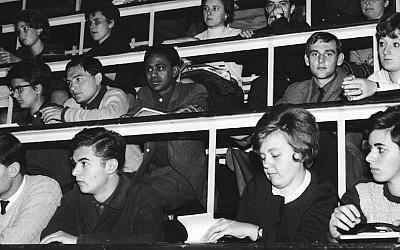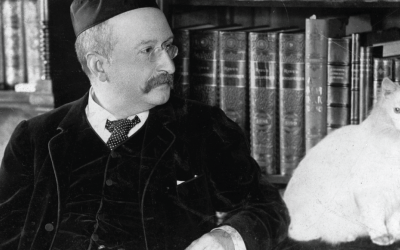Back in 2003, Gary Jones talked to Donald Davidson about our minds, other minds and the external world.
Unarguably one of the most important philosophers of the latter half of the twentieth century; arguably the most, Donald Davidson has been writing highly influential essays from the 1960s onwards. The breadth of his body of work is impressive. He has produced important and highly original work in the philosophy of language, the philosophy of mind and action theory. His work exhibits a remarkably unitary and systematic character. This is particularly unusual in twentieth century analytic philosophy, where the approach to philosophical problems is usually more piecemeal.
"I try to express what is attractive about a position by showing how it fits together with other things which we find plausible" he explains.
Maybe this fitting together of philosophical doctrines which characterises Davidson's work has its roots in the early stages of Davidson's philosophical training. In his second year of undergraduate studies he took a seminar given by Alfred North Whitehead, who, Davidson says "more or less befriended me, which, of course flattered me enormously." Davidson describes Whitehead's unusual approach to teaching philosophy: "Whitehead's approach was, at the end of his life, very much based on teaching the history of philosophy, studying various large scale schemes, treating them as if they were poetry which, given my background, was very appealing to me at that time. For a long time, I simply thought of philosophy as interesting constructions. The question of whether any of it was true wasn't even in sight." Even after meeting Quine and being taught by him, Davidson's approach didn't immediately come to resemble the hard-headed analytic style which we now recognise as Davidsonian.
"In fact, I wrote my dissertation on Plato. It wasn't until I had to teach courses on analytic philosophy, and had to learn about lots of new subjects in philosophy that I really began to take a more analytic approach."
In no other single essay is the coherence and interrelatedness of Davidson's views more obvious than "Three Varieties of Knowledge" (reprinted in Subjectivity, lntersubjectivity and Objectivity), where he ties together many of his views on interpretation, truth, objectivity, epistemology, language and thought.
"I think that probably ‘Three Varieties of Knowledge’ comes closest to pulling together many of my main ideas. A reader who wants an overview might well begin there."
In that paper Davidson considers three kinds of knowledge: knowledge of the external world, knowledge of our own minds and knowledge of other minds, each of which has its own distinctive status.
"What I know about the contents of my own mind I generally know without appeal to evidence or investigation. There are exceptions, but the primacy of unmediated self-knowledge is attested by the fact that we distrust the exceptions until they can be reconciled with the unmediated. My knowledge of the world outside of myself on the other hand, depends on the functioning of my sense organs, and this causal dependence on the senses makes my beliefs about the world of nature open to a sort of uncertainty that arises only rarely in the cases of beliefs about our own states of mind. Many of my simple perceptions of what is going on in the world are not based on further evidence; my perceptual beliefs are simply caused directly by the events and objects around me." Philosophers have often worried about how we can know what other people are thinking, and even whether we can know that they are thinking at all. Knowledge of what is going on in other people's minds is, as Davidson says "never immediate" as perceptual knowledge is. "I would have no access to what other minds think if 1could not note their behaviour."
Many philosophers have tried to avoid skepticism by explaining how one type of knowledge is somehow explainable in terms of another. Davidson notes the history of failures of such explanations, and finds the failures themselves illuminating. "Three Varieties of Knowledge" is an attempt to show why the three kinds of knowledge are irreducible and, in fact, mutually dependent.
"The three sorts of knowledge form a tripod: if any leg were lost no part would stand." This view develops from the view captured in his metaphor of "triangulation", which, Davidson believes, is a necessary condition for there to be thoughts at all. For example, consider a primitive learning situation. Some creature is taught to respond in a certain way to a certain class of stimulus. A child, say, learns to produce the "table" in response to tables.
A question which naturally arises is why we should say that the child is responding to tables, and not to some more proximal stimulus like the firing of certain nerve endings.
"It seems natural to us to say that the child is responding to tables because it is natural - to us," says Davidson. We are similar to the child and group tables together too. "Involved in the picture are three similarity patterns. The child finds tables similar; we find tables similar; and we find the child's responses similar." And as Davidson explains in "The Second Person", "Given these three patterns of response we can assign a location to the stimuli that elicit the child's responses. The relevant stimuli are the objects or events we naturally find similar which are correlated with responses of the child which we find similar. It is a form of triangulation: one line goes from the child in the direction of the table, one line goes from us in the direction of the table, and the third line goes between us and the child. Where the lines from child to table and us to table converge, the stimulus is located."
Davidson says that his theory of triangulation is "basically a very simple idea". Its importance lies in the fact that communication of the sort described by the metaphor of triangulation is "a necessary, but by no means sufficient, condition for thoughts to have contents, and so for there to be beliefs. The external check (necessary for there to be objectivity) can only be got through communication with another mind."
Davidson goes on to say, "Ostensive learning is absolutely basic to communication." Ostensive learning is learning by having things physically pointed out to us with accompanying verbal explanations. "Without it we couldn't even get started," claims Davidson. "We discriminate things naturally, responding to stimuli in very sophisticated ways. Ostensive learning makes use of this." Given the picture of communication Davidson describes, we can see how the three kinds of knowledge are mutually dependent.
Knowledge of one's own mind and of the external world arc both dependent on knowledge of other minds, since until a baseline has been established by communication with someone else, there is no way that one's thoughts can have "propositional content" (thoughts that could be expressed in sentences), and, in particular, there can be no thoughts about the external world. Similarly, knowledge of other minds is not possible without knowledge of one's own since attributing thoughts to others necessarily involves matching the verbal and non-verbal behaviour of others to our own sentences. Nor is it possible without presupposing knowledge of the external world since triangulation involves each person recognising that they occupy spaces in a shared world.
The emphasis on the social nature of the situation and on the significance of ostension may remind readers of Wittgenstein, who Davidson frequently mentions as an influence on his thinking. Davidson is quick to acknowledge the sources of his inspiration and to mention those philosophers who have influenced him. "I have learnt so much from the students that I have taught over the years," he says. Whitehead was an influence in getting him started, and Quine, his teacher and a good friend, has also been an enormous influence. "There are so many people whose work I greatly admire. Dummett is certainly one I admire, John McDowell another, and Tyler Burge is another, but really there are so many very, very good philosophers doing very good work at the moment.
Davidson is very positive about the current state of analytic philosophy. "I think that we are in, if not a golden age, then, at least, a very bright silver age."
But he is quick to add a serious point about keeping a healthy perspective on philosophy; "Alas, I don't think philosophical problems are the big problems of today. I think we've got some others which are far more pressing."
Despite having already produced one of the largest, most foundational bodies of work in recent philosophy, Davidson is not content to rest on his laurels. "I still like to put my oar in when I have the opportunity," he says. He has, in fact, just completed a first draft of a short book on a traditional philosophical problem, which used to be called "the problem of the unity of the proposition".
"That's the name under which it was discussed by Russell, Frege and Wittgenstein. It's actually a problem that goes back to Plato. And as far as I can see, it's a problem that remains unsolved in the minds of most philosophers working in the semantics of natural language."
So what is the problem? This is what Davidson has to say about how we account for the way meaning ("semantics") works for a simple type of sentence which has just a name and a "predicate" - a word which tells us something about the person or thing named.
"Consider what the semantics are for the very simplest sort of sentence, a sentence which just consists of a proper name and a predicate. What Plato said explicitly in The Sophist is that the name refers to a certain person and the predicate brings into the picture a form or universal. That immediately raises the question: what is the relationship between these two things? Plato had a lot of names for the relationship, but he didn't think of the relationship itself as being a further semantic element."
Davidson tries to understand how we arc to deal semantically with such a relationship and thinks that a few clues are to be found in the work of Aristotle, who Davidson observes "noticed that Plato made the forms too much like the individuals that instantiated them so that you have these two things standing alongside each other and then the question is how they 'get together'.
"Aristotle goes on to say that universal don't exist except in so far as they are instantiated in individuals. This doesn't, of course, solve the semantic problem, but it seems to recognise it. I think that there hasn't been much progress on this until Frege, but I don't accept his rather strange solution to the problem." Davidson alludes to the problem as far back as his famous article "Truth and Meaning" (1967), but only spends one sentence discussing it there. Only now, 35 years on, does Davidson get to discuss the problem in detail.
"I think that I recognised what the solution was for so long, but I didn't realise that other people hadn't solved it too, so at the point where I wrote "Truth and Meaning" I didn't realise it was a problem that was still bugging people. So when it finally came to me that other people hadn't got it yet I thought I might as well write a little book on it. I've just sent the first draft to a publisher. I know that I'm going to get a lot of criticism on it."
Davidson is modest. He is acutely aware of the difficulties of some of his positions and of the problems with the ways in which he has sometimes expressed his views. He mentions "A Coherence Theory of Truth and Knowledge" saying "There is no paper I have written that I would more like to rewrite. It has attracted a lot of criticism. I have, in effect, been rewriting it ever since it was first written."
It is a symptom of his modesty that he is reluctant to impose his views on others. He describes himself as "merely presenting what is attractive about a position". He is reluctant too, to give advice to a would-be or novice philosopher:
"I don't have any advice. Well, a sound, but not necessarily advanced knowledge of logic and formal semantics is enormously useful for people intending to work in certain areas of philosophy, but I'm not one to insist on any general principles. Different people work in different ways and have very different ways of producing good work. I'm happy to encourage them all." Davidson the philosopher is not easy to sum up. The usual terms used to classify philosophers often fail to apply to him in an interesting way. Is he, for instance, a realist or an antirealist about truth? That is, does he think that the truth about the world exists independently of us or not? "These are just words," he says. "Lots of philosophers who call themselves realists insist on some form of a correspondence theory of truth [a theory which says, roughly that what makes a statement true is a fact about the world], but since I think that makes no sense, in that sense, I'm not a realist. But if you mean something else by 'realism', perhaps I am a realist. But, by Michael Dummett's standards, I guess I am a realist."
And is he a physicalist? One might have thought that since he says that every event and object has a physical description, that he is a physicalist. But he would deny this. He describes himself as a Spinozist. When discussing his conclusion to his famous paper "Mental Events", he emphasises that although he says that every mental event that is causally related to another event is a physical event, he says that he just thinks that the mental and physical are just different modes of description. "It's not the case that one has priority relative to the other. In fact, it's easy to come up with a mental description of any object or event."
Davidson the man is modest, brilliant and very charming. It seems that more than forty years of producing important essays, teaching in the world's best philosophy departments, debating with the world's best philosophers and doing innumerable interviews has given him a perspective and breadth of vision which is hard to find.
You might also like...















